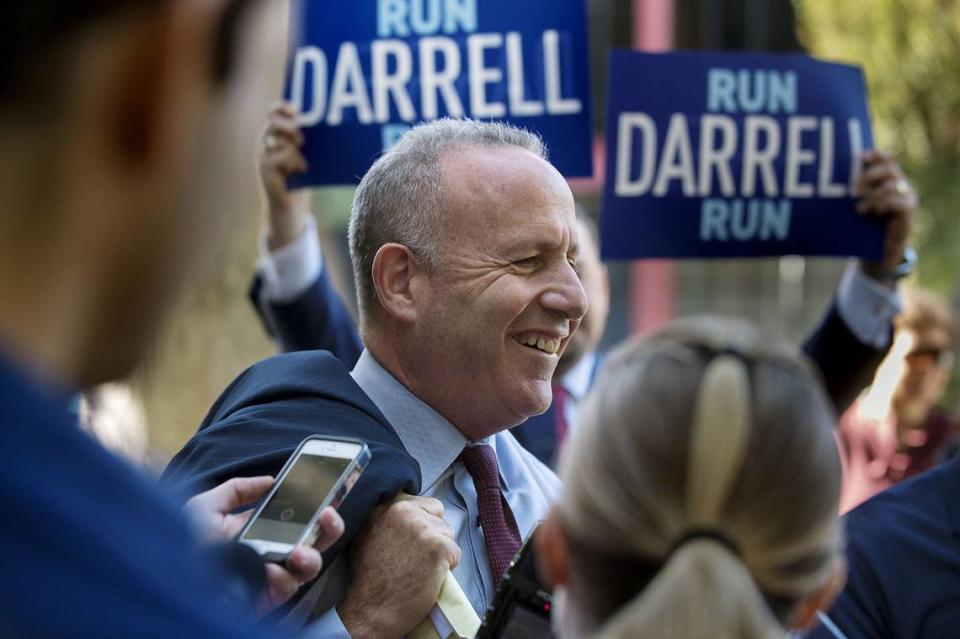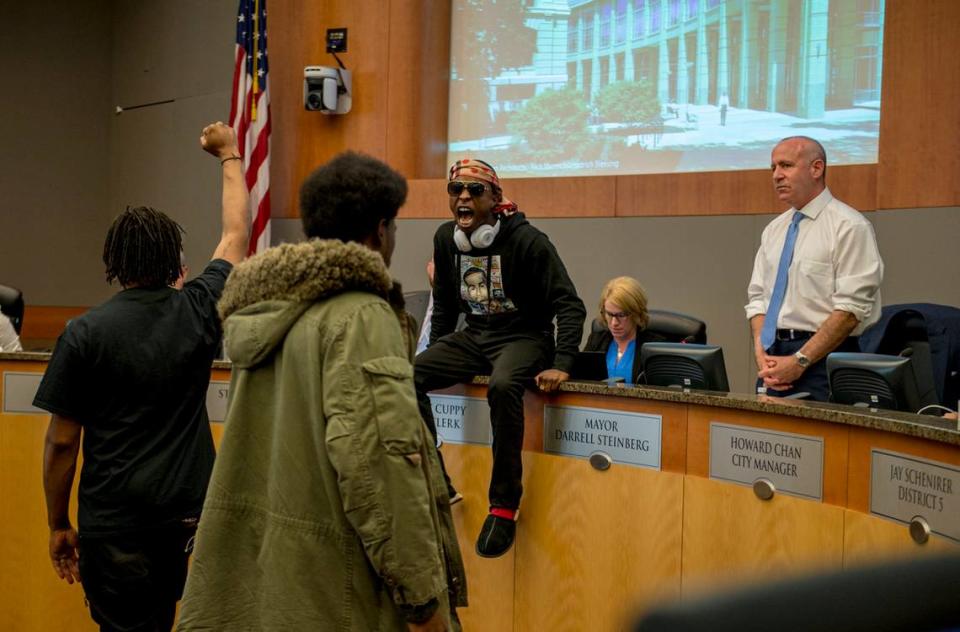A look back at Darrell Steinberg’s career and time as Sacramento’s 56th mayor
- Oops!Something went wrong.Please try again later.
Darrell Steinberg’s tenure as Sacramento’s mayor will end after next year, as he announced Thursday morning he will not run for re-election in 2024.
Steinberg’s role as a political leader in Sacramento has taken many forms over the past three decades: from his election to the Sacramento City Council in the early 1990s; to his tenure in the California Assembly and state Senate representing Sacramento County districts; then back to the council dais for two terms as mayor, a role to which he was first elected in 2016.
Steinberg easily won re-election in 2020, securing more than 77% of the vote.
Here is a look back at Steinberg’s beginnings and political career, including highlights before and during his time as mayor.
Before political office
Steinberg’s life before politics took him across the state of California. He was born and raised in the Bay Area, earned a bachelor’s degree from UCLA and then received his law degree from the UC Davis School of Law.
Steinberg, now 63, worked for a decade as an employee rights lawyer with the California State Employees Association, and as a mediator.
Decades later during his time as Sacramento’s 56th mayor, Steinberg would put his mediator experience on display as he brokered deals during high-profile labor disputes.
First stint on Sacramento City Council
Steinberg, a Democrat, first ran for city office in 1992, elected that June to represent District 6, covering Sacramento’s Tahoe Park area.
He took office that September following the resignation of Kim Mueller, who was appointed as a judge to the federal bench.
Steinberg in his first council stint created a task force targeting absentee landlords and introduced plans to establish additional afterschool programs for K-12 students.
“We need to follow through on the promise of funding and having a strong community mental health system,” he said during the closing weeks of his first stint in office before joining the state Assembly, according to Sacramento Bee archives.
Voters elect Steinberg to state Assembly, then Senate
Voters first elected Steinberg to the Legislature in 1998, choosing him to represent the Assembly’s 9th District.
He represented the 9th District from 1999 to 2004, then served in the state Senate from 2006 to 2014, representing the state’s 6th District. Both districts covered the core of the Sacramento metropolitan area.
From 2008 to 2014, Steinberg was president pro tem of the Senate.

During his Assembly tenure, he chaired the budget, judiciary and labor committees.
In both legislative bodies, Steinberg focused his efforts on a range of topics including education, mental health care and workplace safety.
His Assembly Bill 34 expanded mental health programs statewide. Assembly Bill 1127 increased civil and criminal penalties for series Cal-OSHA violations. Then-Gov. Gray Davis signed both bills into law in 1999.
Steinberg in January 2015 created the Steinberg Institute, a nonprofit organization intended to“dramatically raise the profile and increase the effectiveness of mental health policy-making in California,” according to its website.
The institute focuses on matters of public policy related to mental health as well as substance use.
Early years as mayor: Deal-brokering, and a Measure U win
Steinberg won his bid to become mayor of Sacramento in June 2016, taking 55% of the vote in a field of eight candidates that included Angelique Ashby, who served alongside Steinberg as mayor pro tem or vice mayor until her election last year to state Senate.
Steinberg succeeded two-term mayor Kevin Johnson, who served from 2008 to 2016.
Some of the most memorable moments for Steinberg came during his first few years in office, in times of conflict and unrest.
In November 2017, Steinberg brokered an agreement between Sacramento City Unified School District and its teachers union in a weekend meeting at his Greenhaven home, helping avert a looming teacher strike.
One of Steinberg’s biggest victories while in office was voters’ passage in 2018 of Measure U, renewing a half-cent sales tax hike first enacted in 2012.
The mayor during that year’s election cycle was the most vocal champion of Measure U, saying its funds would go toward addressing homelessness, building affordable housing, and creating jobs and equity for young people.
While Measure U has propelled some projects, the arrival of the COVID-19 pandemic in early 2020 derailed many of those plans, leading the city to use Measure U funds for other purposes in the face of drastically reduced city parking revenue.
The measure has been criticized by some in recent years for its use toward police funds.
Mayor faces community protests, unrest
The fatal March 2018 shooting of Stephon Clark, a 22-year-old Black man, in Clark’s grandmother’s backyard put California’s capital city in the national spotlight as it ignited calls from the public for police reform and transparency.
Sacramento residents took to the streets in the days, weeks and months following Clark’s death in protest of the shooting and ensuing developments.
Clark’s brother, Stevante Clark, in March 2018 council meeting disrupted proceedings, storming the chambers and telling Steinberg to shut up. The mayor adjourned the meeting early, citing safety concerns.
Two days later at Stephon Clark’s funeral, Stevante apologized and called upon protesters to “forgive the mayor.”

In a State of the City speech in February 2019, Steinberg said he was sorry for Clark’s death and that he would push to invest $200 million in Sacramento’s lower-income neighborhoods in the coming years to prevent similar tragedies, using Measure U funds.
Another protest, following Sacramento County prosecutors’ decision in March 2019 not to file criminal charges against the two officers who shot Clark, ended with police arresting 84 people on an East Sacramento bridge, including multiple media members and clergy. Steinberg condemned officers’ arrest of news reporters doing their job.
When protests emerged yet again in June 2020, this time in response to the murder of George Floyd by a Minneapolis police officer, disorder again hit the streets of downtown Sacramento.
Steinberg made the controversial decision to institute a citywide curfew after days of protest. Hundreds of California National Guard troops were also deployed in Sacramento, after the city made the request to Gov. Gavin Newsom.
The mayor at the time said the curfew was needed to curtail violence and vandalism after days of property damage downtown.
Steinberg has also been an outspoken proponent of gun control measures. Following the April 6, 2022, gang shootout that left six people dead and 12 injured in downtown Sacramento — the deadliest mass shooting in city history — the mayor called gun violence in America a “sickness.”
“The proliferation of guns and lack of adequate societal and mental health supports in our country means more people are armed and ready to pull the trigger,” he said last year. “We all know this.”
A major-league deal falls through
One of the most profound disappointments of Steinberg’s mayoral tenure is the collapse of a deal to expand Major League Soccer into Sacramento.
Steinberg and other city leaders in 2019 touted the arrival of billionaire investor Ron Burkle and partner Matt Alvarez, who seemed to have every intention of bringing MLS to California’s capital city. MLS Commissioner Don Garber even made a formal announcement in downtown Sacramento.
The deal, which The Bee reported kicked off in earnest when Steinberg picked up the phone and began negotiating, was heralded at the time as one that would be a major economic boost to the Railyards district, which has sat in disrepair for years.
Instead, Burkle in February 2021 informed MLS that he would not move forward with the acquisition, citing issues related to the COVID-19 pandemic.
Last week, MLS selected San Diego for a MLS expansion franchise. Steinberg in a statement said the city will nonetheless move forward with construction on a “first-class” soccer stadium at the Railyards.
“Hopefully, it will be in partnership with Major League Soccer but either way we are going to work in partnership with the Sac Republic team, the community, and the fan base to bring years of great soccer to Sacramento.”
For now, Sacramento Republic FC will continue to play in the lower United Soccer League.
A focus on homelessness, but critics call for more
Steinberg’s legacy in recent years has largely been defined by his response to Sacramento’s growing homelessness crisis.
Critics, including progressive homeless activists, say Steinberg has not taken enough action, or urgent enough action, to secure affordable housing and shelter beds for the unhoused.
In August 2021, the mayor unveiled a comprehensive master plan to address homelessness. It included proposed sites for shelter projects and tiny homes in the city.
But the numbers continue to reflect Sacramento’s dire homeless crisis, as projects failed to materialize or were delayed.
Steinberg plans to finish out his full term as mayor, which concludes at the end of 2024.
Photos: Key moments in Darrell Steinberg’s two terms as mayor of Sacramento

